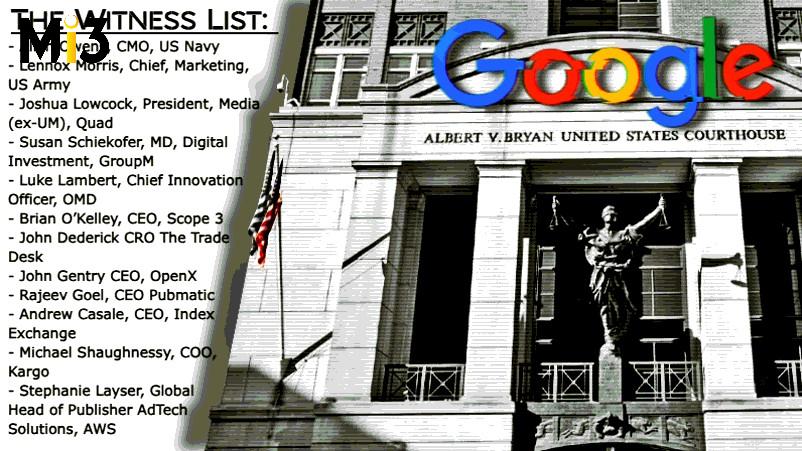Google claims open web display no longer exists as Justice Department adtech break-up trial begins

Google is back in court facing accusations of building a “trifecta of monopolies” to own and control the $677 billion display ad market, hurting advertisers and publishers.
The US Department of Justice alleges the search giant bought, built, and bullied its way to domination in violation of antitrust laws.
The first day’s evidence focused on Google’s 2007 acquisition of DoubleClick for $3.1 billion, which it then adapted and grew to become the backbone of the global ad market.
The focus is on the Google Network, a suite of products which includes ad server Google Ad Manager, AdExchange, and auction tools, which the DoubleClick tech is now woven into.
The DoJ complaint alleges that Google used it to smother the market, gaining an 80 per cent share of advertisers, and 90 per cent of publishers, who are reliant on its ad tech stack.
Google has denied the allegations, and says being big is not evidence of guilt, and its tech has enabled the digital ad market to grow.
The DoJ’s trial attorney Julia Tarver Wood said: “Google is not here because they are big. They are here because they used that size to crush the competition.”
She said Google had a “classic monopolist playbook” and bought competitors, locked in customers and hiked prices.
“Google acquired its way to success” and then built an ad ecosystem that refused “customers the freedom of choice”, she said.
Alphabet has already lost two other antitrust cases in the past year, one that targeted search and the other over its app store.
This trial will be less juicy and more technical, but if Google loses, it will have a greater impact as the DoJ is seeking for the company’s ad tech architecture to be broken up.
The focus of the trial is on Google’s Ad Network. These are the ads Google transacts onto third party sites, including publishers and others.
Of its $260 billion in revenue in 2023, $31.3 billion came from network display ads, according to the company’s most recent annual earnings report.
Google spent the opening day arguing that open web display ads no longer exist and the market has moved on.
Google attorney Karen Dunn told the court: “Today we are one big company among many others” including Microsoft and Amazon, among others.
She said the government’s case was based on an outdated understanding of digital ad markets.
She argued that advertisers buy across a variety of channels including social media, video and within apps, none of which were being challenged in the complaint.
She said the government was trying to open a “time capsule” that would reveal “a BlackBerry, iPod and Blockbuster video card”.
But the DoJ alleged that the underlying motive was profit, saying Google uses its middleman status to drive up the prices for advertisers, and to pay less to the websites that display them.
Tarver Wood said this enabled Google to pocket a larger portion of each ad sale, harming publishers, and website owners.
It then used its influence to lock out competitors, and rigged the rules to pad its bottom line, she added, saying Google keeps about 36 cents on every ad dollar, and can raise prices on a whim.
The evidence revealed fascinating insights into the scale of Google’s business:
- The court heard Google manages 13 billion ads a day, or five trillion a year.
- Eight in 10 advertisers rely on Google ad tech, and nine in 10 publishers.
- Google’s GAM ad server also enjoys an 87 per cent market share.
Another pivotal claim in the DoJ’s prosecution is that Google built its ad stack so customers had to buy all its products for it to work well, which delivered Google monopoly-sized profits.
In an interesting twist, the DoJ intends to call former DoubleClick VP Neal Mohan, currently the CEO of Google’s YouTube’s CEO, to testify.
In another, Google’s lead lawyer on day one had to be excused early to help US Presidential candidate Kamala Harris prepare for her TV debate with Donald Trump.
Google argues its end-to-end integration makes ad tech more efficient, secure and reliable, and marketers choose Google because it’s the best.
If it was broken up, it “would slow innovation, raise advertising fees and make it harder for thousands of small businesses and publishers to grow”, Google claims.
It preempted its defence by running a detailed blog post at the weekend, as well as a video explaining its view of ad tech
The DOJ counters that Google’s grip on the market has broken the economics of advertising against premium content, forcing many websites away from ads to subscription or to shut down. Executives from News Corp, Daily Mail and USA Today publisher Gannett are listed to appear in the coming days.
The New York Times reported: “The stakes for Google are high. The government has pre-emptively called for a breakup of the company’s ad-tech business, which generated $31 billion in revenue last year, or about a tenth of overall revenue. If Google is found to have violated antitrust law, it could be forced to sell the technology it bought with DoubleClick, reshaping the internet giant and changing the way that web page ads are sold.”
The Big Tech on Trial Substack added:
“If the government prevails and Google’s dominion over advertising is diminished, we can expect publishers and advertisers to get revenue shares more favourable to them. The free press will live. A Google victory on the other hand would be a sign of just how difficult it is to overcome what is a largely antitrust-sceptical judiciary.
“If a level of nearly complete control of an industry like this is not found to be a monopoly, many in the antitrust crowd may throw up their hands and wonder what is.”
The trial is expected to run for four to six weeks.





